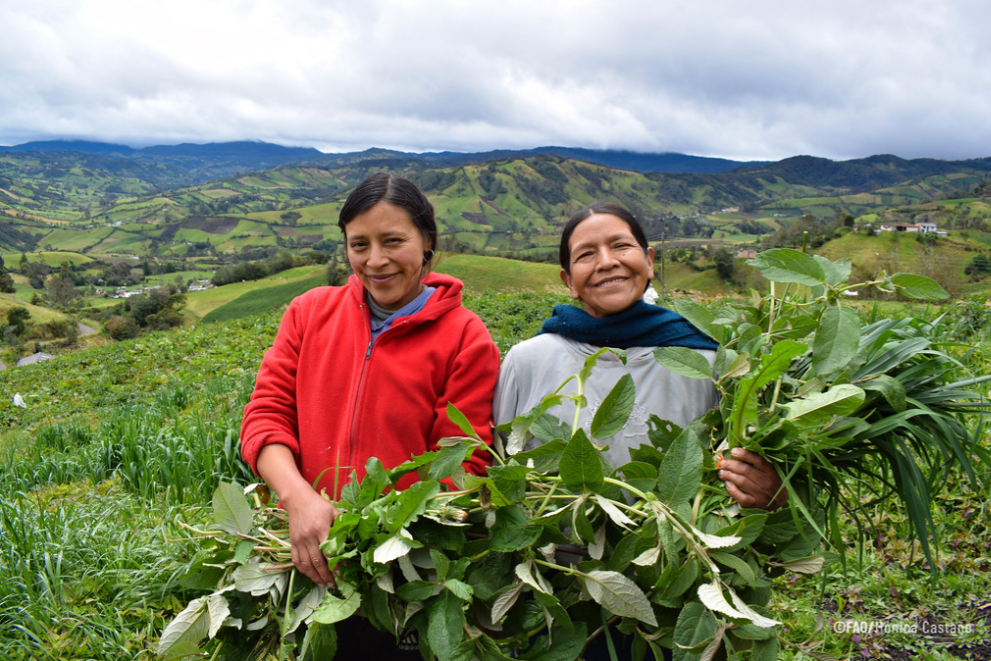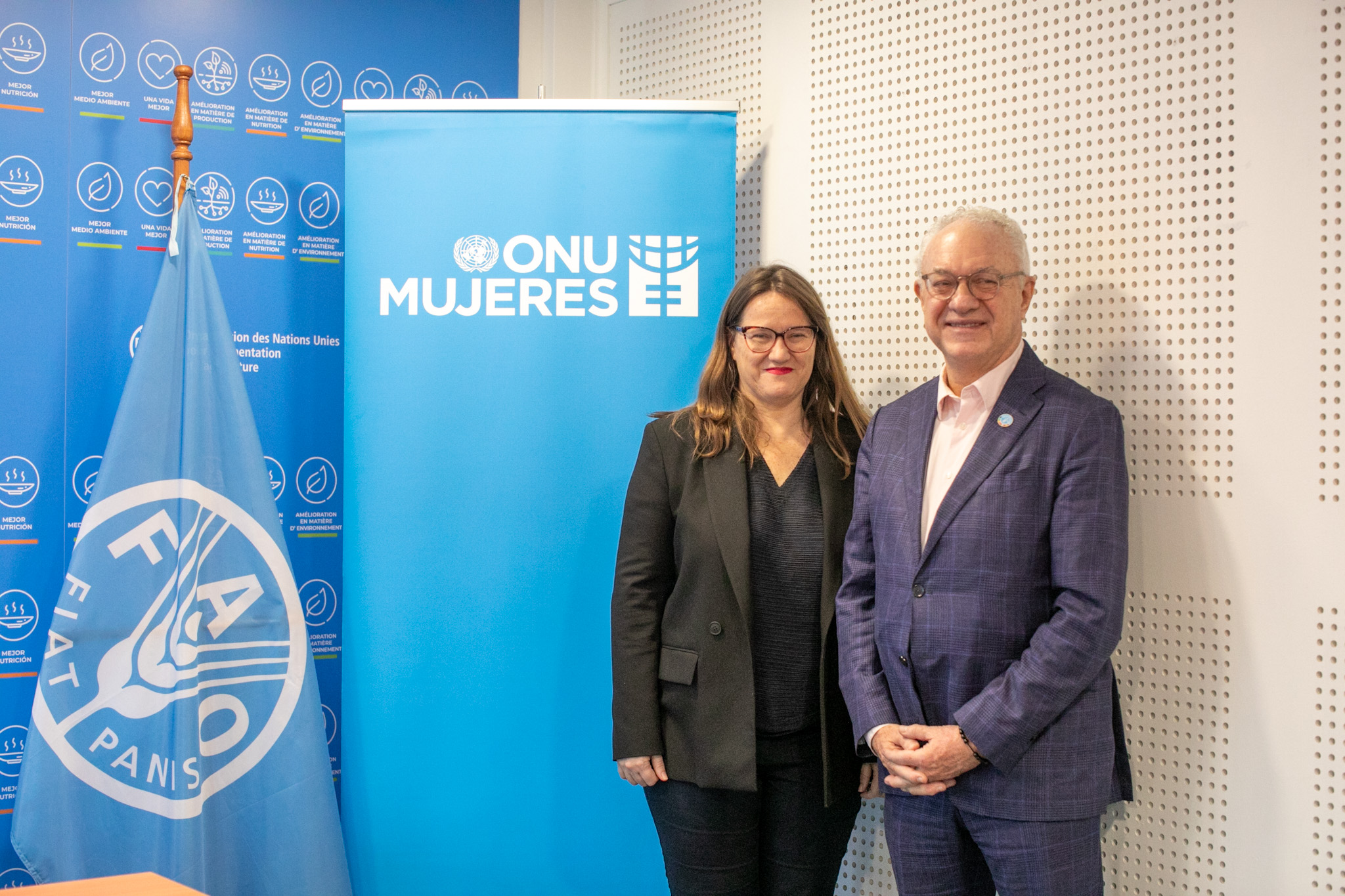FAO, UN Women, and UNFPA agree on a plan to advance rural women's rights in Latin America and the Caribbean
The agreement focuses on high-level policy and normative advocacy to accelerate the reduction of the gender gap in access to productive resources and rural coverage of care services, sexual and reproductive health, and gender-based violence.
Date:

Santiago, Chile, October 6, 2023 - The Food and Agriculture Organization of the United Nations (FAO), UN Women, and the United Nations Population Fund (UNFPA) signed a two-year joint work plan to accelerate progress in gender equality and the empowerment of rural women in Latin America and the Caribbean.
Rural women face multiple obstacles to gaining independence and economic stability. In crises, rural women are most affected by poor access to resources, services, and information, the heavy burden of unpaid household and care work, and discriminatory traditional social norms.
Globally, rural women represent one-third of the population and 43% of the agricultural labor force. FAO says women account for more than 20% of agricultural employment in Latin America and the Caribbean.
In Latin America, women spend three times more time on domestic work and unpaid care than men. In addition, there is a significant gap between women in urban and rural areas, with the latter spending 3 to 10 hours more than women in urban areas.
The action plan proposed by these three agencies of the United Nations System is structured around two areas: high-level political and policy advocacy to accelerate the reduction of the gender gap in access to productive resources (land, water, and fishing) to achieve food and nutritional security in Latin America and the Caribbean, within the framework of Sustainable Development Goals 2 (Zero Hunger) and 5 (Gender Equality and Women's Empowerment).
The second priority is to promote rural coverage of care services, sexual and reproductive health, and gender-based violence in the region and the production of data and information on rural women in the framework of agrifood systems, incorporating data on their physical, economic, and decision-making autonomy.
The joint work will be developed with an intersectional approach, prioritizing indigenous peoples and afro-descendants, age and human mobility factors, and mobilizing resources necessary to make joint actions feasible in the territories and communities.

"The collaboration between FAO, UN Women, and UNFPA will contribute to addressing gender inequalities and food and nutrition insecurity, complementing actions that support the empowerment processes of rural women in Latin America and the Caribbean. We will work together to reduce gender gaps in access to productive resources, improve women's economic autonomy and climate resilience, and achieve more sustainable and inclusive agrifood systems throughout the region," said FAO Assistant Director-General and Regional Representative for Latin America and the Caribbean, Mario Lubetkin.
"This action plan with FAO and UNFPA is aligned with UN Women's regional strategy to achieve economic autonomy and access to comprehensive care systems for rural women in Latin America and the Caribbean. For UN Women, it is essential that all efforts by governments in the region to reduce poverty, inequality, and hunger, as well as productive, agrifood and environmental policies, incorporate a gender perspective and address the discrimination faced particularly by rural, indigenous, Afro-descendant and women in mobility situations," said Cecilia Alemany, UN Women Deputy Regional Director for the Americas and the Caribbean.
"Guaranteeing the autonomy of rural women is a priority task that cannot be postponed, and it is a task that we must do jointly. The signing of this agreement contributes and gives meaning to previous actions; it is very important to strengthen this type of collaboration at the regional level. The situations and problems we work with are complex, as they reflect multiple dimensions and, therefore, require collective efforts. All sustainable food systems are deeply rooted in the daily lives of families and especially of women in the sense that issues such as maternal mortality have had setbacks in the region, returning to basic situations where women die in childbirth or postpartum, which is closely related to the nutritional situation of women," said Susana Sottoli, UNFPA Regional Director for Latin America and the Caribbean.
For more information, please contact:
Ricardo Rivera, FAO, Tel: +56985609312, ricardo.rivera@fao.org
José Baig, ONU Mujeres, Tel: +353-896-042-676, jose.baig@unwomen.org
About UN Women
UN Women is the United Nations organization that promotes gender equality and women's empowerment. As a global champion for women and girls, UN Women was established to achieve equality, advance women's human rights, improve conditions for women and respond to the needs that women in all their diversity face worldwide.
Follow UN Women at https://lac.unwomen.org/es
Siga a ONU Mujeres en Facebook | X | Instagram | LinkedIn | YouTube
About FAO
FAO is the United Nations agency leading the international effort to end hunger. Our goal is to achieve food security for all while ensuring regular access to sufficient and good quality food for an active and healthy life.
For more information about FAO and its work, visit:
https://www.fao.org/americas/oficinas-regionales/es/
Follow FAO at @FAOAmericas
About UNFPA
UNFPA, the United Nations Population Fund, helps women and young people lead healthy, productive lives.
UNFPA is the lead United Nations agency contributing to a world where:
- every pregnancy is wanted
- every birth is safe
- every young person reaches their full potential.
In addition, it has organized its work around three transformative, people-centered outcomes between now and 2030:
- zero unmet need for contraception;
- zero preventable maternal deaths;
- zero gender-based violence and harmful practices, such as child marriage and female genital mutilation.
Follow UNFPA at: Facebook | Instagram | X | LinkedIn | Youtube